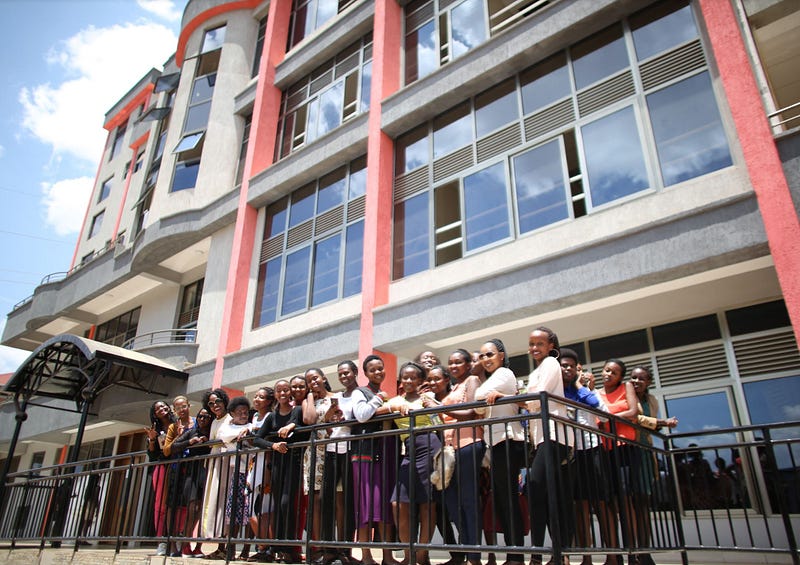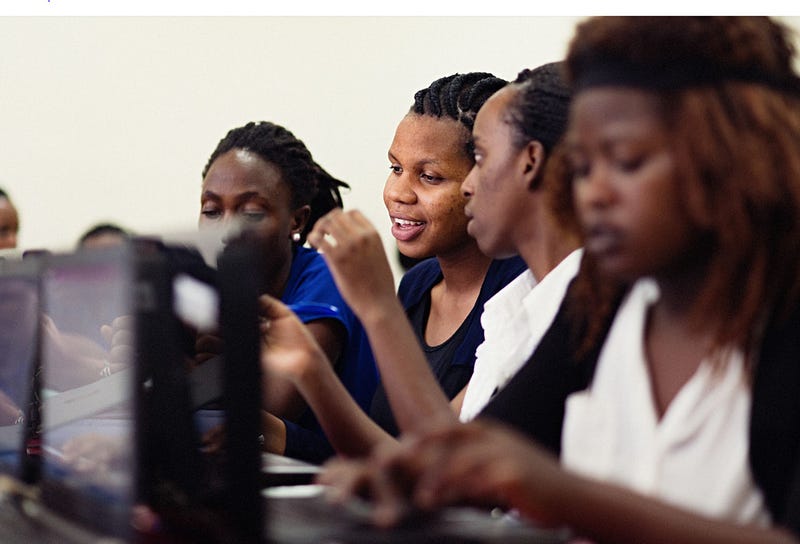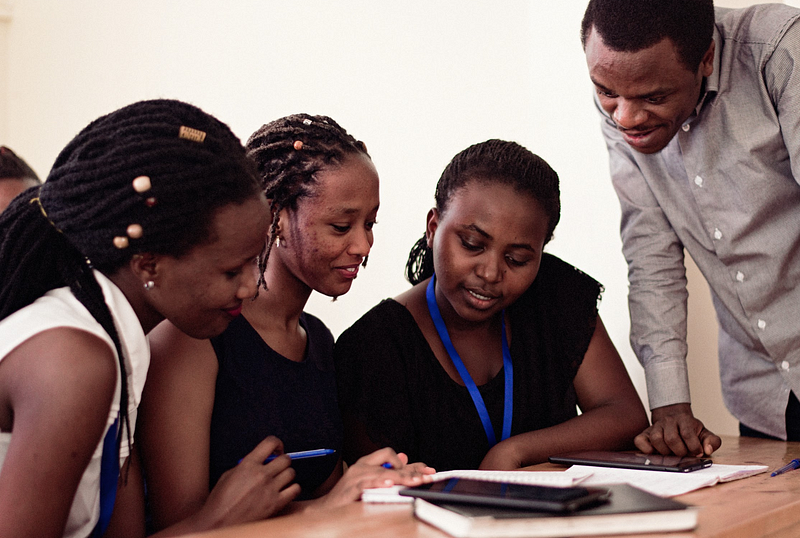The Future of Global Education
By Karen Sherman (President of the Akilah Institute) and Brian Warren (Entangled Solutions)
One can hardly listen to the news today without hearing about another college or university closing for good. Declining enrollments amidst heavy competition, higher costs, and other challenges make it ever more difficult to remain afloat, let alone grow.
And yet the next decade will see a swell of secondary school graduates around the world clamoring for high quality, relevant, and affordable degrees. The question is how to create an academic model that can scale affordably to meet that growing demand.

Students at the Akilah Institute campus in Kigali, Rwanda
A new blended education model that the Akilah Institute developed with support from Entangled Solutions offers a path forward. Akilah has been in the business of women’s education in Rwanda for nearly a decade, as it has delivered competency-based degrees linked to high-growth sectors in the economy. Although its model is working, as evidenced by strong completion and graduate employment rates around 90 percent, Akilah has been aggressively chasing a bigger goal: a transformative, scalable model of higher education that prepares young people for a changing world.
The need is urgent, as there are millions of learners that require an affordable option to give them access to the global knowledge economy. The traditional cost structure of higher education just won’t cut it.
With its record of success and experimentation — in 2013, for example, Akilah launched an Information Systems (IS) major at a time when technology was considered an “inappropriate” career for females in Rwanda, which has become a gateway for women like Sandrine and Sonia to land jobs as software developers and engineers in the country’s leading solar energy and digital finance companies — Akilah believes it couldn’t rest on its laurels.

Students in one of the IT Labs at the Akilah Institute
Over the past year, Akilah has worked tirelessly to overhaul its academic program by leveraging blended learning to create an affordable model that can personalize learning for the different skills of entering students and offer a curriculum with a focus on sustainability, ethical leadership, innovation, and building 21st-century skills.
What hasn’t changed is the college’s focus on preparing students for future careers. Rwanda’s Express News praised Akilah’s approach to:
“career readiness training [that] is incorporated in all parts of the curriculum. By the end of the program, students know how to articulate their career goals and skills, pursue new career opportunities, self-advocate, build professional networks, and more.”
It happens to be that leveraging technology in this manner also mirrors a priority of the Rwandan government, which has invested heavily in making the transition to a knowledge-based based economy. In 2016, a new education policy highlighted the role of technology in addressing “the key challenges of access, quality, equity, relevance, and management efficiency.” Blended learning is a core element of this policy.
Research also backs up this emphasis, as it shows that a blended-learning approach outperforms fully online or in-person classes. In 2015, a detailed, longitudinal study of blended learning determined that “online and f2f modes of delivery positively influences student performance.” Furthermore, The Center for Community College Student Engagement’s 2018 National Report, which noted that of the more than 5,000 students that went through their first-year, blended onboarding program, said, “More than 90 percent of the students have visited the career center to work on a career plan,” which means that it is far more likely to result in job placements than the traditional model.

Collaboration space at an Akilah Institute classroom
Despite its benefits, the move to blended learning requires significant work and carries risks for Akilah. Because it disrupts the traditional roles of faculty, Entangled helped to design a new ecosystem approach to mentoring, advising, coaching, and assessment. Akilah’s classroom structure will also evolve to include more open, multi-use spaces to better facilitate student collaboration and support.
To mitigate these operational risks, Akilah plans to pilot blended learning this year before transitioning all programs in 2020.
If one considers the unsustainable costs of traditional higher education alongside its career-detached curriculum, blended learning has the potential to address scale and resource challenges, not only globally but also in the United States. The broader adoption of blended learning, however, will require institutions to shift boldly from constructing edifices to investing in faculty training and technology and to building more student-centered cultures and relationships outside of their academic world. In other words, it’s a big shift.
As Michael Horn, the chief strategy officer of the Entangled Group and an EdSurge columnist said:
“Digital learning is growing rapidly across higher education, but oftentimes schools simply implement shiny new features instead of focusing first on their learning model and then on how to operationalize that with an emphasis on outcomes and scale. Getting the sequence right, however, can unlock huge potential to change the lives of millions of learners left out of the traditional system.”
Like colleges everywhere, Akilah is driven by relentless pressure to create opportunities for as many young people as possible and, at the same time, boost outcomes for students. Leveraging technology allows it to meet these dual goals as it expands rapidly across Africa and Asia. The way our teams see it, nothing less than the future of education is at stake.
Karen Sherman is the President of the Akilah Institute, Rwanda’s first women’s only college. It is here that Africa’s female leaders are educated to solve the world’s most pressing challenges through a lens of opportunity and sustainability.
Brian Warren is a consultant for Entangled Solutions, a leading strategy and innovation consultancy for education.
